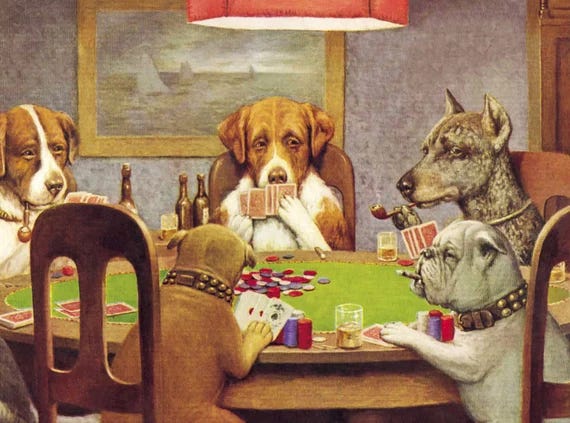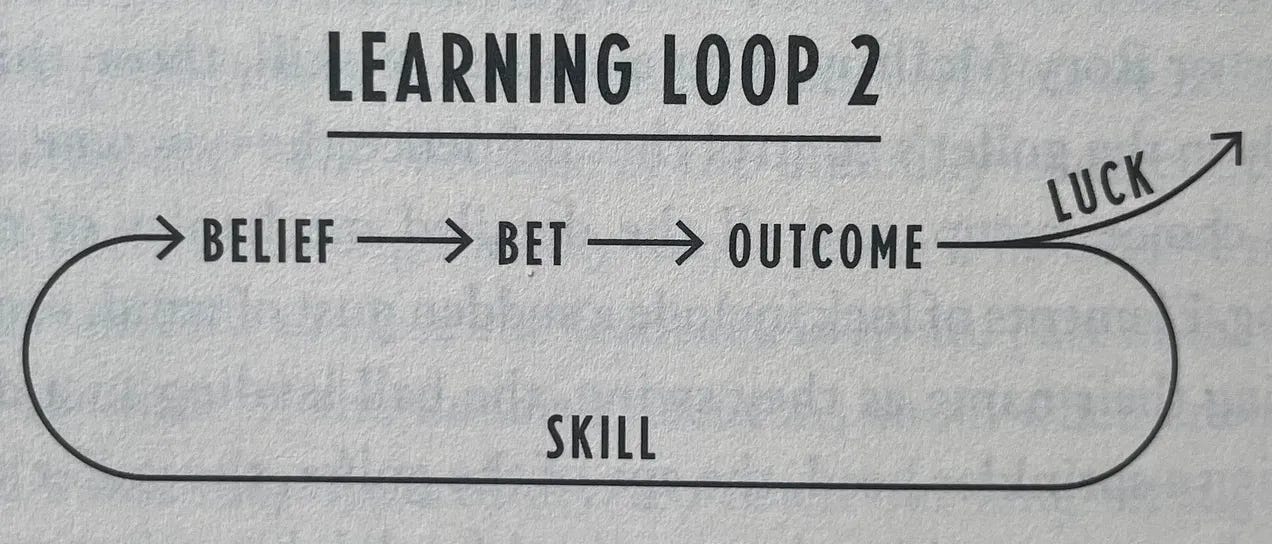The Poker Hand
I looked down at my cards—A♠ A♦. Pocket aces. Best hand you can get in Texas Hold ’Em. The board showed 7♠ 8♦ Q♣ A♥.
I was sitting pretty. Triple aces. No way I lose this.
Then came the river: 9♣.
I flipped my cards with confidence—until my buddy showed 10♠ J♠.
He’d hit a straight. The one thing I didn’t see coming.
We were in middle school, betting nickels in a friend’s basement. The pot was maybe five bucks, but it felt like Vegas.
That night stuck with me—not because I lost, but because I played it right… and still lost.

Decisions Are Bets, Not Guarantees
Former poker pro Annie Duke has a phrase for this: “Life is poker, not chess.”1
In chess, you win by logic. In poker, you win by playing the odds—but chance always has a seat at the table.
That’s why:
You can make the right call and still lose.
You can make a dumb move and somehow win.
And you’ll never know for sure which was which—unless you zoom out and separate the decision from the outcome.
The Decision/Outcome Gap
We love clean narratives:
Good decision = Good result
Bad decision = Bad result
But that’s not how uncertainty works. According to Duke:
“Outcomes don’t tell us what’s our fault and what isn’t… we can’t simply work backwards from the quality of the outcome to determine the quality of our beliefs or decisions.”
Here’s what actually happens:
Good decisions can lead to bad outcomes.
Bad decisions can lead to good outcomes.
Luck always plays a role.
The only thing in your control is the process behind the decision.

Mental Model Shift: Judge the Process, Not the Result
Next time something goes well, ask yourself: Was that smart—or did I just get lucky?
Next time a decision blows up in your face, ask yourself: Was that avoidable—or just rotten luck?
This mindset builds resilience. It keeps you learning. It keeps you from overcorrecting based on a fluke.
How Decisions Become Learning

This is what separates average decision-makers from great ones. The best don’t just chase outcomes—they refine their inputs over time.
We’re Always Betting on a Future Self
At the end of the day, every decision we make is a bet on the future version of ourselves.
Annie Duke writes:
“Whenever we make a choice, we are betting on a potential future… that the return to us (measured in money, time, happiness, health, or whatever we value) will be greater than what we are giving up by betting against the other alternative future versions of us.”
Poker just makes that bet more visible. Life is messier, but the logic still holds.
The Poker Lesson (Again)
Even top poker players—world-class decision-makers—lose 40% of the time over hours of play. That’s a whole lot of “wrong” from the best in the world.
If they can accept uncertainty, so can we.
Takeaway
Don’t tie your self-worth to outcomes.
Tie it to your decision making process.
Make thoughtful bets—and keep playing the long game.
—Grant Varner
Annie Duke, Thinking in Bets: Making Smarter Decisions When You Don’t Have All the Facts (Portfolio, 2018)




I love the frames here.
As entrepreneurs, we must accept that not every choice will yield immediate success, but by consistently making informed decisions, we set ourselves up for long-term wins.
This is excellently written. It extends detachment from past decisions with less than ideal outcomes and inspires to keep going forward.